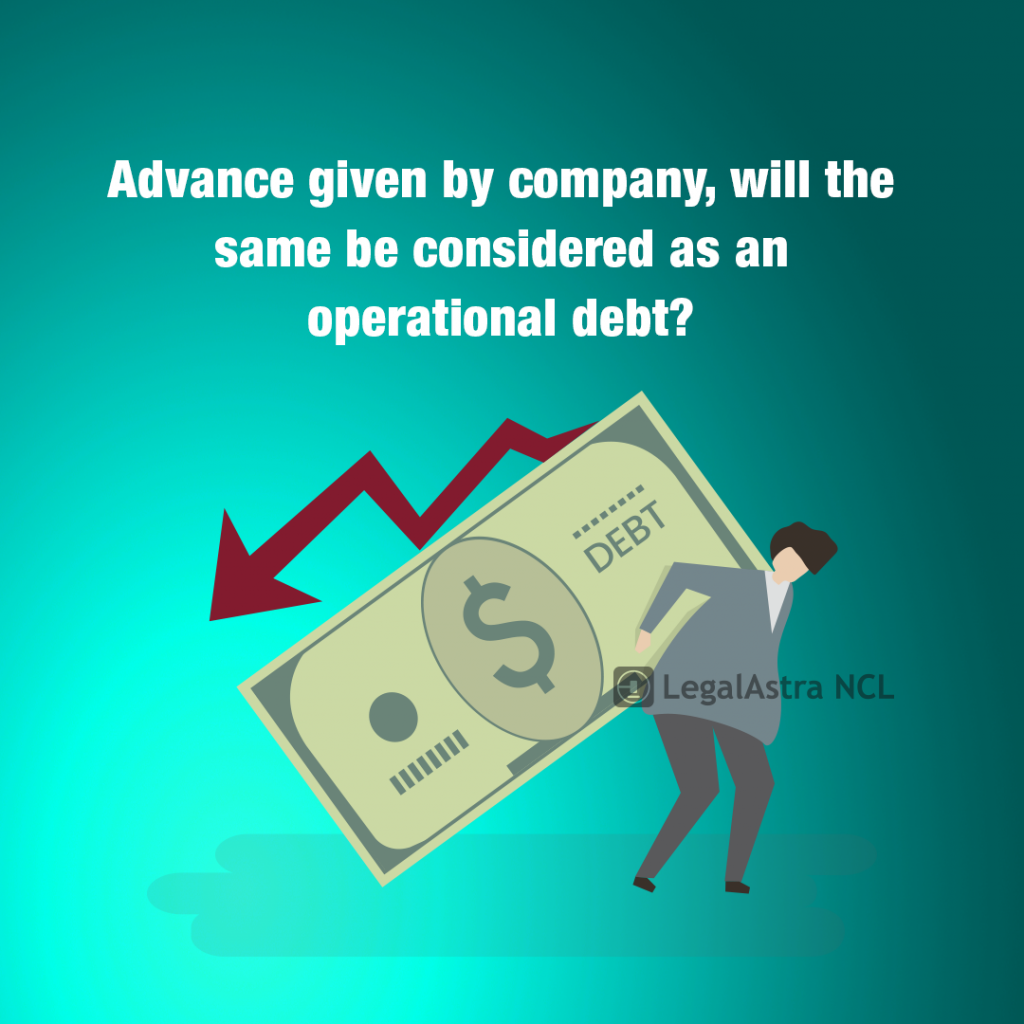In the matter of Nupower Renewables Private Ltd. vs. Cape Infrastructure Private Ltd. (07.07.2017 – NCLT – Chennai) : MANU/NC/0983/2017:
The Application has been filed by the Applicant u/s. 9 of the Insolvency and Bankruptcy Code, 2016 claiming the advance amount paid by the Applicant to the Respondent along with interest.


Track your NCLT / NCLAT cases or orders in your apple iOS / Google Android smartphones. Available for free trial period of 15 days.
Two main issues were discussed as follows:
- Whether the Applicant falls within the purview of Section 5 (20) of Insolvency and Bankruptcy Code, 2016?
Section 5 sub-section (20) of the Code reads as follows:
“Operational Creditor means a person to whom an operational debt is owed and includes any person to whom such debt has been legally assigned or transferred”.
- To understand the term “ Operational Debt” with respect to purposive and contextual interpretation:
Section 5 sub-section (21) of the Code reads as follows:
“Operational debt means a claim in respect of the provision of goods or services including employment or a debt in respect of the repayment of dues arising under any law for the time being in force and payable to the Central Government, any State Government or any local authority “
In order to explain “Operation Debt”, the relationship between the client and the Law firm was given as an example by the Petitioner and the same is as follows:
“If the Law firm is paid for rendering the services by a client and the Law firm fails to render such services, then the client can claim the money advanced on account of the services which were to be rendered by the Law firm. Similarly, in case the Law firm renders the services and the client has not paid, the Law firm can make the claim. Therefore, in both the ways, consideration is paid/agreed to pay, falls within the definition of ‘Operational Debt’.
The Hon’ble National Company Law Tribunal, Chennai Bench allowed the application of the Operational Creditor confirming “The advance amount paid by the Petitioner to the Respondent is in respect of rendering services and therefore it is an operational debt” and declared Moratorium. Accordingly, the Application is admitted.
Thus, from the above referred case, on satisfaction of Section 5(20) and 5(21) of the IBC, the advance amount was claimed u/s. 6 of the Code was admitted.
These are the following cases where the National Company Law Tribunals have stated that “advance given” does not constitute to be a Financial Debt or an Operational Debt as per section 5(8) & 5 (20) of the Insolvency & Bankruptcy Code, 2016 and the possibility of treating the petitioners in the below cases as Financial Creditor and Operation Creditor was discussed.
Sajive Kanwar vs. AMR Infrastructure (16.02.2017 – NCLT – Principal Bench): MANU/NC/0104/2017
Two petitions u/s.7 &9 of IBC were transferred to the Principle Bench. The Bench made a bare perusal on the definition of Financial Creditor and Financial Debt and Operational Creditor and Operational Debt.


Track your NCLT / NCLAT cases or orders in your apple iOS / Google Android smartphones. Available for free trial period of 15 days.
The Hon’ble Bench dismissed both the Petitions stating :
- “The Learned Counsel of Applicant has not been able to show from any material on record or otherwise that it is a financial transaction in which a debt has been disbursed against the consideration for the time value of money and he being the Financial Creditor is entitled to trigger the insolvent process against the Respondent in accordance with Section 7 of the IBC.”
- It is doubtful whether Operation Debt would include all debts other than “Financial Debt’ because we do not find any such ‘Legislative intendment’ from the Part II of IBC which deals with ‘Insolvency and Liquidation for Corporate Persons’ Therefore it does not fall within the four corners of Section 9 of the IBC.
Vinod Awasthy vs. AMR Infrastructures Ltd. (20.02.2017 – NCLT – Principal Bench) : MANU/NC/0443/2017
Application filed u/s. 9 of the IBC claiming the advance paid and assured return from the Respondent. Reference made to Sajive Kanwar vs. AMR Infrastructure and the term Operational Creditor was explained and the case was dismissed.
Pawan Dubey and Ors. vs. J.B.K. Developers Private Limited (03.08.2017 – NCLAT) : MANU/NL/0059/2017
Application filed u/s. 9 of the IBC claiming the advance paid and assured return from the Respondent. Reference made to Vinod Awasthy vs. AMR Infrastructures Ltd. and Sajive Kanwar vs. AMR Infrastructure where Section 9 of the IBC was explained and the case was dismissed stating the Appellant did not fall within the purview of Sec.9.
It is to be noted that the above mentioned cases: Nupower Renewables Private Ltd. vs. Cape Infrastructure Private Ltd. ,Vinod Awasthy vs. AMR Infrastructures Ltd. and Sajive Kanwar vs. AMR Infrastructure has been referred in the case stated below which was filed under section 9 claiming advance amount paid by the Applicant as the service supposed to be rendered by the Respondent was not performed and the Hon’ble National Company Law Tribunal decision is as follows:
Nagai Power Pvt. Ltd. vs. GEI Industrial Systems Ltd. (20.07.2017 – NCLT – Ahmedabad) : MANU/NC/0888/2017
“The crucial question that involves in this Application is whether the advance amount paid by the Applicant to the Respondent for supply of Air Cooled Condenser machinery in terms of Letter of Award is ‘operational debt’ or not within the meaning of sub-section (21) of Section 5 of the Code.
In the above mentioned matter, two Division Benches of equal strength rendered two different decisions in respect of advance amount paid towards services rendered or in respect of goods supplied. So the Adjudicating Authority decided to refer the matter to a Larger Bench placed the same before the Honorable President of the National Company Law Tribunal on the issue whether advance amount is an ‘operational debt’ or not.”
